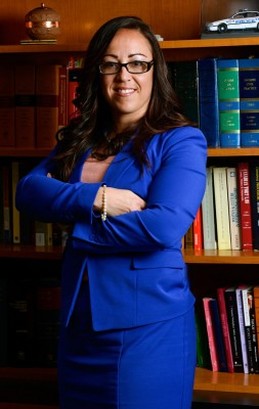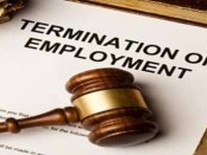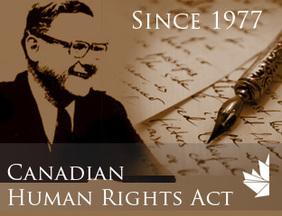
York Regional Police Association in-house counsel Pamela Machado discusses how she constantly challenged herself and pushed the envelope to land a job as the legal representative for more than 2,000 police officers
Interview by Christopher James Palafox
Chances are, if Pamela Machado were to be put into a mould, she would go ahead and shatter it. She grew up as a first-generation immigrant with a family background and no postsecondary education, so the likelihood of her becoming a lawyer was initially low, but, undeterred, she cold-called her way into her first position straight out of law school. Five years later, she’s now the in-house counsel for the York Regional Police Association (YRPA) in Ontario, overseeing legal services and compliance for more than 2,000 individuals. Here, she details how she’s continuing to upend expectations and push boundaries.
Advantage: Let’s get this out of the way. Your approach to land your first job wasn’t exactly normal. Why do something so bold?
Pamela Machado: No, it’s not the normal procedure. The normal procedure of doing things is like a cattle call from all the Toronto firms attending law schools and spending 15 minutes with each candidate. I was looking at my colleagues, sending cover letters and résumés out frantically to these large firms, and it was just not appealing to me in any way. I wanted to do something where people actually knew my name and my voice would be heard.
You didn’t just start randomly calling up law firms though, right?
I knew of this firm, Matlow Miller Cummins Thrasher [MMCT], growing up. I called them, and I spoke to one of the partners, and the response I got was, “We don’t need anyone.” So I said, “Well, can you give me the interview experience?” I went in, they liked the interview, and they offered me a position. I went back to school after the break with a summer position as my classmates were frantically waiting for callbacks.
How did that lead to the opportunity with the YRPA?
I had been at MMCT for five years, and I started to do contract work for police unions. Information regarding the York position kind of fell on my plate through a colleague. It was completely different from what I was doing because it was labour and employment law instead of criminal and civil law. There were about 30 applicants, and I think I was the youngest, so it was very flattering.
Now that you’ve been there for a couple of years, can you talk about what sets the YRPA apart from other labour organizations?
Some orgs represent thousands of members; we have 2,000 members. Within the four-person executive team, we can name everyone, if they’re married, and what their kids’ names are. We have a personal touch here between police officers and civilian members.
What about other police associations?
We’re larger and have more resources available to us; lots of orgs don’t have in-house counsel. We can even undertake challenges that smaller organizations can’t complete—on their behalf. Also, because we’re a bit on the outskirts, we don’t get as much press about us in the papers like, say, Toronto; so we have the benefits of a larger org but not necessarily all of its disadvantages.
What are your big-picture goals as the sole person in charge of the YRPA’s legal dealings?
Managing the public perception of police officers and the overall protection of all of our members. We work closely with the Police Association of Ontario and others so [that] we can ensure that the public is educated about the costs of policing and the roles of officers. We work daily to ensure our members’ rights are protected and their hard work and commitment to safer communities are recognized.
What’s the job like day to day?
I handle all employment grievances, so any work-related or contract-related issues members face like working conditions, accommodations, salary, and contract bargaining. The articles of our contracts are being interpreted differently daily, so I’m in charge of that as well to ensure future rounds of bargaining are effective. In addition, I act as a resource to the executives, who are resourced daily to assist all of our members.
You recently bargained for a three-year contract. What was that like?
It was the first contract that I negotiated when I got here. One of the major obstacles we faced was the state of the political climate and the economy of that time. Unions were being questioned, and police-services boards were reluctant to sign on to anything over two years because of that. We were able to break through these challenges and become the first police association to get a three-year deal with significant increases for our membership.
What sorts of benefits did you end up winning?
Our major success was the psychological benefits. We received an almost 70 percent increase in coverage, bringing it up to $2,500 a year. That was very important for us to push for, given that PTSD issues are coming to the forefront within policing.
Overall, what would you say is your role’s biggest challenge?
Becoming recognized in such a large and established profession within this policing organization, especially as a female. I would like all of the members to know who I am, what role I play, and that I am available. We have a magazine we publish four times a year, so we reach out through that. Overall, although challenging, it is important to me to maintain an open-door policy while choosing which issues require immediate assistance and which don’t without minimizing the interests of those involved
What in your industry gives you pause? Where can others within it do better?
No disrespect to others within my profession, but the status quo appears to be the standard for many. You do what you need to do to get the job done, and then you go home. I think you need to continually push the envelope and go above and beyond. It’s difficult for me at such a young age because I’m always put up against the standard of the aged white-haired lawyer. That’s probably the biggest pet peeve I have—that success is measured by age. I think I’ve proven otherwise, but I always have to keep proving that.
We’ve spoken at length about your work life, but what do you think is your biggest personal success?
I maintain my friendships, strong family ties, and I don’t allow myself to simply become enveloped by my job. I don’t allow my job to define who I am. I wouldn’t be here if it weren’t for those relationships, so I always try to ground myself in those roots.
Do you have any passions outside the office?
I’m a huge volleyball person. I’ve played my whole life. I try to play indoors in the winter and at the beach in the summer. It’s just a way to meet new people and gain new perspective. I also enjoy reading anything that’s not law-related. It allows me to come back with a fresh perspective.
What other goals do you hope to accomplish in your career?
Our legal profession is measured in an old-fashioned way, and I strive to show that the young legal professionals are as capable if not more capable than they’re given credit for. Sitting here, I’m the youngest person in my field. I want to continue proving myself so I can look back and say that I was able to set an example for those that came before me and those that will come after me.
Interview by Christopher James Palafox
Chances are, if Pamela Machado were to be put into a mould, she would go ahead and shatter it. She grew up as a first-generation immigrant with a family background and no postsecondary education, so the likelihood of her becoming a lawyer was initially low, but, undeterred, she cold-called her way into her first position straight out of law school. Five years later, she’s now the in-house counsel for the York Regional Police Association (YRPA) in Ontario, overseeing legal services and compliance for more than 2,000 individuals. Here, she details how she’s continuing to upend expectations and push boundaries.
Advantage: Let’s get this out of the way. Your approach to land your first job wasn’t exactly normal. Why do something so bold?
Pamela Machado: No, it’s not the normal procedure. The normal procedure of doing things is like a cattle call from all the Toronto firms attending law schools and spending 15 minutes with each candidate. I was looking at my colleagues, sending cover letters and résumés out frantically to these large firms, and it was just not appealing to me in any way. I wanted to do something where people actually knew my name and my voice would be heard.
You didn’t just start randomly calling up law firms though, right?
I knew of this firm, Matlow Miller Cummins Thrasher [MMCT], growing up. I called them, and I spoke to one of the partners, and the response I got was, “We don’t need anyone.” So I said, “Well, can you give me the interview experience?” I went in, they liked the interview, and they offered me a position. I went back to school after the break with a summer position as my classmates were frantically waiting for callbacks.
How did that lead to the opportunity with the YRPA?
I had been at MMCT for five years, and I started to do contract work for police unions. Information regarding the York position kind of fell on my plate through a colleague. It was completely different from what I was doing because it was labour and employment law instead of criminal and civil law. There were about 30 applicants, and I think I was the youngest, so it was very flattering.
Now that you’ve been there for a couple of years, can you talk about what sets the YRPA apart from other labour organizations?
Some orgs represent thousands of members; we have 2,000 members. Within the four-person executive team, we can name everyone, if they’re married, and what their kids’ names are. We have a personal touch here between police officers and civilian members.
What about other police associations?
We’re larger and have more resources available to us; lots of orgs don’t have in-house counsel. We can even undertake challenges that smaller organizations can’t complete—on their behalf. Also, because we’re a bit on the outskirts, we don’t get as much press about us in the papers like, say, Toronto; so we have the benefits of a larger org but not necessarily all of its disadvantages.
What are your big-picture goals as the sole person in charge of the YRPA’s legal dealings?
Managing the public perception of police officers and the overall protection of all of our members. We work closely with the Police Association of Ontario and others so [that] we can ensure that the public is educated about the costs of policing and the roles of officers. We work daily to ensure our members’ rights are protected and their hard work and commitment to safer communities are recognized.
What’s the job like day to day?
I handle all employment grievances, so any work-related or contract-related issues members face like working conditions, accommodations, salary, and contract bargaining. The articles of our contracts are being interpreted differently daily, so I’m in charge of that as well to ensure future rounds of bargaining are effective. In addition, I act as a resource to the executives, who are resourced daily to assist all of our members.
You recently bargained for a three-year contract. What was that like?
It was the first contract that I negotiated when I got here. One of the major obstacles we faced was the state of the political climate and the economy of that time. Unions were being questioned, and police-services boards were reluctant to sign on to anything over two years because of that. We were able to break through these challenges and become the first police association to get a three-year deal with significant increases for our membership.
What sorts of benefits did you end up winning?
Our major success was the psychological benefits. We received an almost 70 percent increase in coverage, bringing it up to $2,500 a year. That was very important for us to push for, given that PTSD issues are coming to the forefront within policing.
Overall, what would you say is your role’s biggest challenge?
Becoming recognized in such a large and established profession within this policing organization, especially as a female. I would like all of the members to know who I am, what role I play, and that I am available. We have a magazine we publish four times a year, so we reach out through that. Overall, although challenging, it is important to me to maintain an open-door policy while choosing which issues require immediate assistance and which don’t without minimizing the interests of those involved
What in your industry gives you pause? Where can others within it do better?
No disrespect to others within my profession, but the status quo appears to be the standard for many. You do what you need to do to get the job done, and then you go home. I think you need to continually push the envelope and go above and beyond. It’s difficult for me at such a young age because I’m always put up against the standard of the aged white-haired lawyer. That’s probably the biggest pet peeve I have—that success is measured by age. I think I’ve proven otherwise, but I always have to keep proving that.
We’ve spoken at length about your work life, but what do you think is your biggest personal success?
I maintain my friendships, strong family ties, and I don’t allow myself to simply become enveloped by my job. I don’t allow my job to define who I am. I wouldn’t be here if it weren’t for those relationships, so I always try to ground myself in those roots.
Do you have any passions outside the office?
I’m a huge volleyball person. I’ve played my whole life. I try to play indoors in the winter and at the beach in the summer. It’s just a way to meet new people and gain new perspective. I also enjoy reading anything that’s not law-related. It allows me to come back with a fresh perspective.
What other goals do you hope to accomplish in your career?
Our legal profession is measured in an old-fashioned way, and I strive to show that the young legal professionals are as capable if not more capable than they’re given credit for. Sitting here, I’m the youngest person in my field. I want to continue proving myself so I can look back and say that I was able to set an example for those that came before me and those that will come after me.

 RSS Feed
RSS Feed





